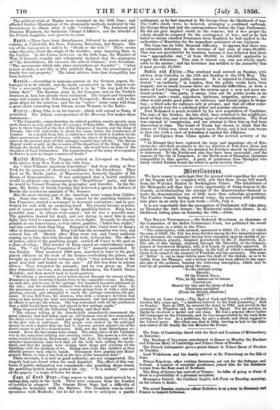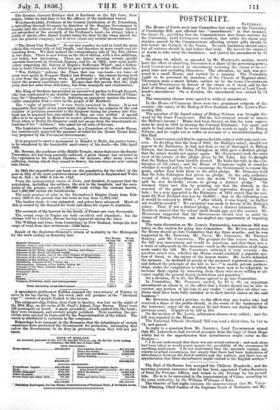314iortil1lurntto.
We have /town to anticipate that the general wish regarding the entry of the Guards will be complied with, and that those troops will march from the Waterloo Station to Buckinabam Palace. The inhabitants of the Metropolis will thus have every opportunity of doing honour to the Guards, notwithstanding the attempt of the Quartermaster-General to make the demonstration one of little more than suburban proportions. The Fusilier Guards having arrived today, the ceremony will probably take place on an early day net week.—Globe, July 4, It is not improbable that the prorogation of Parliament will take place on Thursday the 24th instant ; the Ministerial white-bait dinner, in all likelihood, taking place on Saturday the 19th.—Glode.
THE BELLOT TESITMONIAL.-Sir Roderick Murchison, as chairman of the Committee of the Bellot Testimonial Fund, has published the result of its labours, in a letter to the Times. "The subscription, with interest, amounted to 22811. 178. 8d. of which the sum of 16101. 12s: lld, has been divided amongthe five unmarried sisters- of the deceased, the remainder having been expended upon an obelisk of po- lished Aberdeen granite designed gratuitously by Mr. P. Hardwick, B.A. The site of this obelisk, obtained through the liberality of the Commis- sioners of Greenwich Hospital, will, it is hoped, be generally approved. It is the quay of our great naval asylum in the hall of which a monument in about to be raised to the memory of Franklin and his associates. The name of (Bella ' is cut in large letters upon the shaft of the obelisk, so as to be visible from the Thames; and a bronze tablet has been affixed to the oppo- site side of the pedestal, bearing the following inscription, which may be read by all persona passing along the quay.
'To the intrepid young
BELLOT,
Of the French Navy, Who, in the endeavour to rescue Fnerneens, Shared the fate and the glory of that illustrious navigator.
(Front his British admirers.) 1853.'"
Deem or LORD Conx.--The Earl of Cork and Orrery, a soldier of dis- tinction fifty years ago, "a landlord beloved by his Irish peasantry," died on Sunday. Born in 1767 he entered the Army in 1785, and served in the campaign in Flanders and the expedition to Egypt. For his services in Egypt he received a medal and one clasp. He was a general officer before the campaigns in the Peninsula, and he was incapacitated by his rank from serving in the war. As a politician, he gave a steady and silent support to the Liberal party. His eldest son died in 1834, leaving as heir to the dike and estates of the family the late Member for Frome.
The Duke of Cambridge dined with the Earl and Countess of Malmesbury on Saturday.
The Duchess of Inverness entertained at dinner on Monday the Duchess and Princess Mary of Cambridge. and Prince Oscar of Sweden.
The French Ambassador gave a grand dinner to Prince Oscar of Sweden on Tuesday.
Lord Wodelionse awl hie fenny arrived at St. Petersburg on the 234. of June.
Prince Napoleon, after visiting Inverness, set out for the Orkneys and. Iceland. A number of scientific gentlemen joined him for his. Northern voyage from the East coast of Scotland.
The King of Greece has arrived at Vienna : he talks of going to Paris if there is a probability of a pleasant reception. Monsignor Patrizi, the Cardinal Legate, left Paris on Tuesday morning, on his return to Rome.
The noted Russian engineer officer Todleben is on a tour in Germany and. France toinspect fortresses. The Russian General Riidiger died at Karlsbad on the 22d June, from dropsy, before he had time to try the efficacy of the medicinal waters. Wyschnechradski, Professor at the Central Institution of St. Petersburg, is travelling through Germany by direction of the Russian Government to inquire into the systems of education pursued there. The German literati are astonished at the strength of the "Professor's head—he always takes a battle of spirits after dinner besides doing his duty by the wines placed be- fore the general company, and it never causes any mental inconvenience.
"The Great City Frauds." In our last number we told in brief the story which this volume tells at full length, and therefore in more ample and in- teresting form. We than noticed the extraordinary sale of the first edition in two days. There is now before us the third edition, with a few additions, not bulky, but interesting. There are letters showing certain specific amounts recovered by Overend, Gurney, and Co. in 1854; some more parti- culars respecting the history of Hagen's Sufferance Wharf; and a dedica- tion to Lord Clarendon, for which he gave permission in his official capacity.
"Wm. Cobbett " informs the Times that ten van-loads—ten tons—of meat were spoilt in Newgate Market last Monday; the owners having held it over from the preceding week, in preference to selling it at anything below the present exorbitant rate. He says that this proves that the high price does not arise from deficiency, but from monopoly and combination.
The King of Sardinia has granted an unreserved pardon to Joseph Jacque% who was condemned to six months' imprisonment by the tribunal of Chem- bery for " blasyhemy,"—that is, deducing an argument against the imma- culate concept= from a verse in the gospel of St. Matthew.
The "right of petition" is very freely exercised in Russia. It is not impossible that eight or ten years must elapse before the subjects of the vast number of petitions presented to the Emperor during his journey into Fin- land can be inquired into and settled—if they are ever settled. A special office is to be opened in Moscow to receive petitions during the coronation. Even when at Berlin theEmperor could not escape from the importunate at- tentions of his " children," who asked for all sorts of favours.
The Legislative Assembly of Canada, in a Committee of the whole House, has unanimously approved the measure of relief for the Grand Trunk Rail- way proposed by the Provincial Government.
It is proposed to erect a monument to Handel at Halle, his native town ; to be completed by the hundredth anniversary of his death—the 13th April 1859.
Mr. Broome, the gardener of the Middle Temple, states that since the Smoke Prevention Act has been partially enforced, a great change has occurred in tha vegetation in the Temple Gardens : for instance, after many years of suffering, during which they ceased to flower, his rose-trees are now coming into bloom.
In 1854 the expenditure per head on the population for the relief of the poor in fifty of the most populous unions and parishes in England and Wales was 48. 3d.; in 1866 it was 4s. lltd.
From the quinquennial census of Paris, just finished, it appears that the population, incluinag the soldiers, the sick in the hospitals, and the occu- pants of the prisons, exceeds 1,200,000 souls within the customs barrier, and 1,800,000 within the fortifications.
The total produce of sales in the Encumbered Estates Court from Feb- ruary 1850 to the present tine has been no less than 17,893,124/.
The leather trade is very animated, and prices have advanced. Much of this is caused by the demand for boots and shoes for export to Australia.
The accounts of the harvest in the South of Prance are very favourable.
The cereal crops in Naples are both excellent and abundant ; but the vintage will be a failure, having appeared among the vines.
The William and Jane, from Canterbury in New Zealand, brings the first cargo of wool from that settlement-1100 balsa
Zymotic Diseases Dropsy, Cancer, and other Diseases of uncertain or variable seat Tubercular Diseases Diseases of the Braun, Spinal Renew, Nerves, and Selma Diseases of the Heart and Blood-vessels Diseases of the Lungs, and of the other Organs of Respiration Diseases of the Stomach, Liver, and other Organs of Digestion
Diseases of tine Kidneys, dre Childbirth, Diseases of the Uterus, Sc. Rheumatism, Diseases of the Bones, Joints, Sc.
Diseases of the Skin, Cellular Tissue, — —. Malformations Premature Birth Atrophy Age • Sadden
violows, Privation, Old, and Intemperance
Total (including unspecified causes) Ten 'Weeks Of 1848-'56.
2924 .... 46.3 .... 190.9 .... 126.8 .... 41.1 100.4 63.8 10.6 10.9
as
2.6
3.0
25.4 27.1 33.9 21.4,
94.0 .... Week of 1856. 228 43 199 239 7 36
39 93
24
84
1,118 1,066.9
A speculative publican at Halifax engaged the executioner of Palmer to serve in his bar during the fair-week and sell portions of the "identical rope" : crowds of people flocked to the tavern.
The emigrant-slip Pallas, from Cork to Quebee, was lost on the night of the 30th May, on. the rocks of St. Paul's Island, Cape Breton. There were 120 passengers on board. A panic prevailed ; crowds rushed into the boats ; they were swamped, and seventy people perished. Next morning the sur- vivors were rescued in boats sent by the 'Superintendent of the island. The wreck is attributed to variation in ibe compasses.
Brigandage is so rampant in the Romagna that the inhabitants of certain communes have petitioned the Government for protection, intimating that unless the Government do its duty in protecting them they will not pay taxes. for the week ending on Saturday last. Result of the Registrar-General's return of mortality in the Metropolis



































 Previous page
Previous page